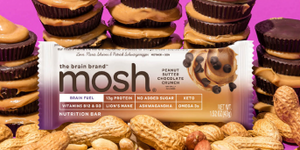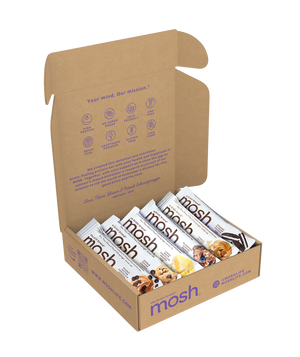Antioxidants are something of a buzzword in marketing. You’ve undoubtedly seen the word plastered all over the advertising of many different foods and supplements.
Blueberries, for example, are a food that most people can tell you is absolutely loaded with antioxidants. But those same people will probably struggle to tell you why that’s such a health benefit.
If you don’t know about antioxidants yet, let us walk you through what exactly they are, and why they’re such a powerful component in a brain-healthy diet.
What Are Antioxidants, and Where Can You Find Them?
Antioxidants are chemical compounds naturally produced in your body and found in various foods. Deconstructing the word “antioxidant” can help to explain its primary purpose. It’s “anti” (against) the effects of oxidation, offering a protective effect.
We can do a deep dive into exactly what that means later. In the meantime, just know that antioxidants do their best to protect your body's cells, enzymes, tissues, and fats from certain types of damage.
The cells in your body are capable of producing their own antioxidants. However, you can benefit from also getting antioxidants from your food.
The Mediterranean Diet, in particular, is widely celebrated for its abundance of foods rich in antioxidants. As long as you don’t use any antioxidant supplements on top of this, you shouldn't risk getting “too many” antioxidants.
The Mediterranean Diet is an excellent start, but many foods are packed with antioxidants. Most fruits and vegetables have some amount of antioxidants. The ones that are more brightly colored are the ones with the higher antioxidant concentration. However, the total number of antioxidants in various foods can be surprising in some cases.
It’s important to keep in mind that the word “antioxidant” is an umbrella term. Technically, the word antioxidant can be used to describe hundreds, if not thousands, of chemical compounds.
Here is a list of a few of the most powerful antioxidants, and which foods have the highest concentration of them:
- Allium Sulphur: garlic, leeks, and onions
- Anthocyanins: blueberries, strawberries, cherries, pomegranates, eggplants, and grapes
- Beta carotene (carotenoids): sweet potatoes, pumpkin, carrots, spinach, lettuce, and squash
- Catechins: red wine, tea, apricots, black grapes, and strawberries
- Coenzyme Q10: organ meats like liver, and oily fish
- Copper: oysters, liver, crab, lobster, and mushrooms
- Cryptoxanthin: squash, papaya, tangerines, red bell peppers, peaches, and oranges
- Diosmin: oranges, lemons, grapefruits, and limes
- Flavonoids: apples, citrus, soybeans, green tea, onions, and red wine
- Indoles: arugula, broccoli, cabbage, cauliflower, and turnips
- Isoflavonoids: lentils, milk, peas, soybeans, and tofu
- Lignans: bran, sesame seeds, and whole grains
- Glutathione: spinach, avocados, asparagus, and okra
- Lipoic Acid: broccoli, spinach, red meat, tomatoes, and peas
- Lutein: arugula, leafy greens such as collard greens, kale, and spinach
- Luteolin: celery, broccoli, carrots, cabbage, peppers, and apples
- Lycopene: tomatoes, guavas, watermelon, pink grapefruit, and papaya
- Manganese: oats, teff, mussels, granola, and blueberries
- Polyphenols: flaxseed, chestnuts, hazelnuts, pecan nuts, and almonds
- Selenium: brazil nuts, tuna, oysters, liver, and grouper
- Vitamin A: liver, sweet potatoes, pumpkin, carrots, and spinach
- Vitamin C: oranges, cherries, broccoli, guavas, and bell peppers
- Vitamin E: acai berries, almonds, granola, sunflower seeds, and avocados
- Zeaxanthin: spinach, swiss chard, mustard greens, turnip greens, and collard greens
- Zinc: oysters, red meat, crab, lobster, whole grains, and milk
- Zoochemical: eggs, red meat, and fish
How Do Antioxidants Support Brain Health?
Earlier, we briefly mentioned that antioxidants help fight against the effects of oxidation. These effects, known as oxidative stress, can be extremely dangerous for the cells, fats, proteins, and DNA throughout your body.
Health conditions like heart disease, vision loss, cancer, and more have been linked to oxidative stress. As if that weren’t bad enough, oxidative stress is especially damaging to your brain and cognitive function.
Oxidative stress can seriously injure and even destroy your brain cells (neurons) and their neural pathways. It’s easiest to think of your neurons as cargo trucks transporting information using a neural-based highway.
The information won’t get far if those roads are full of pot holes and general degradation that makes that transport less efficient, if even possible at all. That’s why oxidative stress is often a precursor to cognitive decline and neurodegenerative diseases such as Alzheimer’s disease, Parkinson’s, and multiple sclerosis.
Unfortunately, oxidation is an inevitable side effect whenever oxygen is metabolized in your body.
Every cell in your body uses adenosine triphosphate (ATP) as its primary energy source. There are a few ways your body creates this fuel, but ultimately, the oxygen involved in these processes is also metabolized, and the cell's mitochondria produce free radicals as a byproduct.
You can almost think of it like “emissions” being put out by our cells during “factory production” of energy.
Free radicals are unstable molecules that have at least one unpaired electron. These unpaired electrons make the free radicals highly reactive and frequently result in oxidative stress — these free radicals try to steal electrons from healthy molecules, which in turn, makes those molecules unstable.
Free radicals are more than just a natural byproduct of energy metabolization. You can also see an increase in free radicals if you’re overexposed to ultraviolet radiation, tobacco smoke, pollution, industrial chemicals, and other environmental stressors.
Diets high in alcohol, refined sugar, processed foods, and saturated fat can also contribute to excess free radicals.
The body can handle its fair share of free radicals, but too much can quickly become overwhelming, especially as you age and the cells in your body become less efficient at removing free radicals — this sometimes leads to age-related cognitive impairment.
That’s why it’s so important to eat plenty of foods high in antioxidants to combat brain aging and support a healthy brain. These additional antioxidants can counterbalance the negative effects of free radicals.
Remember that free radicals are unstable due to their unpaired electrons. Antioxidants hunt down these free radicals and provide them with the electrons necessary to become more stable, without becoming unstable themselves.
The cells previously undergoing oxidative stress by the free radicals can start to repair themselves with the beneficial effects of antioxidants. The less damage they experience, the more likely they can completely heal and function as they should.
Enlist Antioxidants To Protect Your Body and Brain
There is a constant battle being waged within your body. On one side are the cells performing their essential task to keep the body alive and functioning properly. On the other side are the free radicals determined to destroy anything they touch.
Your actions can influence the outcome of this internal battle. Following a poor diet, smoking tobacco, drinking alcohol, and getting too much sun will tip the scales in favor of the free radicals in your body, outbalancing the effects of antioxidants and resulting in oxidative stress.
Unfortunately, you can’t do anything to completely prevent free radicals from being created. They’re the natural by-product of necessary bodily functions.
However, you can help to limit their damage by enlisting the help of antioxidants you take in through the food you eat. Eating more of the foods listed above is an excellent way to increase your antioxidants, fight back against free radicals, and support brain function.
Looking for more helpful articles like this one? Explore our wellness blog, The MOSH Pit, here!
Sources:
Antioxidants: In Depth | NCCIH
Understanding Antioxidants | Harvard Health
Oxidative Stress and the Central Nervous System | PMC
Oxidative Stress: Harms and Benefits for Human Health | PMC
Antioxidants | Better Health Channel
Free Radicals, Antioxidants in Disease and Health | PMC
Marketing's Holy Grail of Terms: Antioxidants | American Council on Science and Health | ACSH









